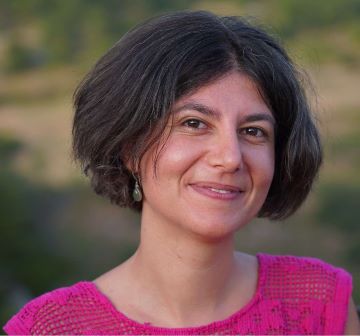Dr. Caterina Scalvedi is a historian of modern Europe and its global entanglements with a specialization in empire, fascism, and education. She joins the Institute of European Studies as a visiting scholar this academic year, and will also teach two sections of the course "University and Knowledge Production" at IUB's Hutton Honors College during the spring 2025 semester. Read more about Dr. Scalvedi's background here.
EURO will be posting clips of our interview with Dr. Scalvedi to our social media channels this week, so please join us there as well if you are not already following our channels!
Welcome to the Institute for European Studies and congratulations on your Ragusa Foundation Grant, which you are using to complete your manuscript, Subjects of Empire: Colonial Education and Imperial Crisis in Italian Africa, 1890-1960. Can you share a few main takeaways that students and instructors can expect when they read your work?
Thank you! Subjects of Empire is the book manuscript I'm currently developing here in Bloomington. It draws from my doctoral work but significantly expands it. The book explores how and why, in early twentieth-century European empires, the larger public-school networks grew in both metropolitan areas and colonies, the more socially diversified and unequal colonial youth’s access to quality education became. Italy's colonial empire in Africa, including Eritrea, Somalia, Libya, and Ethiopia, is the case study at the core of the book.
Concerning the "why", my argument is that European empires turned to colonial education planning as an answer to the legitimation crisis they were facing in the early twentieth century. Europe’s last formal empire, Italy extended its sovereignty on most of its African territories in the interwar period: namely, at the same time in which the Russian Revolution fostered hopes for emancipation in the colonial world and the League of Nations’ humanitarian agenda set supranational standards for imperial rule. By examining a wide range of educational projects and experiences, my book shows that experts and officials used colonial education planning as the key for empire to simultaneously forge hierarchies and showcase its supposed integrity.
When it comes to the "how", my argument is that the policy of colonial education planning was not an Italian invention or mere import from other empires, but resulted from international and interdisciplinary collaboration between officials, teachers, physicians, legal and pedagogic scholars, and child-focused humanitarian activists from across European empires and even North America. After World War II, in the age of decolonization, interwar-era education planning informed United Nations’ practices of development and cultural cooperation. In short, the book shows that colonial education planning has shaped today’s educational inequality between the Global North and the Global South as much as the international aid effort aiming to erase this inequality.
What are the main goals that you would like to accomplish while you are a visiting scholar here at Indiana University?
Indiana University Bloomington is a large, diverse, and welcoming campus that offers a lot to historians of Europe in the modern world like me. I aim to make progress in my book project, take advantage of IU's amazing library resources to look at primary and secondary sources I haven't been able to access in the past, and broaden my intellectual network by connecting to faculty and doctoral students who share my own research interests. I regularly attend the European history monthly workshop, where I have learned about stimulating research projects and will have the opportunity to present my research findings in the Spring semester. I also look forward to joining the writing workshops for faculty, as I am certain that exchanging writing tips with fellow academic writers and reserving time for writing would crucially benefit the development of my book.
As I said, I—who have previously attended enormous campuses such as Sapienza University of Rome (the largest university in the EU) and the University of Illinois Chicago (one of the most diverse campuses in the US)—have been impressed with the large scale of the campus, and especially with how lively and welcoming its diverse community of faculty and students is. My favorite things are the university's emphasis on music and the arts, the Eskenazi Museum's collection, the Indiana University Cinema, and the many free or near-to-free concerts and screenings open to the public; but also facilities such as the elegant Mies van der Rohe Building and the Counsilman-Billingsley Aquatics Center's Olympic-sized pool.
Sure, "University and Knowledge Production" (HHC 202) is a brand-new course that the Hutton Honors College is launching this upcoming spring. Broadly, the course aims to bring together first-year honors students from different departments to inspire their curiosity by showing how the university—and this university in particular—produces new knowledge. Students will explore how faculty do research to answer pressing questions in today's world. I am very excited about teaching this course because teamwork is at its core: the very development of the course is the result of collaboration between faculty from the humanities, the natural sciences, economics, and other fields, and the course will foster collaboration between students majoring in different disciplines. Building on my research expertise in the history of education, I will guide students as they refine their research skills such as close reading, summarizing, fact checking, academic writing and speaking, inviting them to reflect about how knowledge shapes and is shaped by its context of production.


